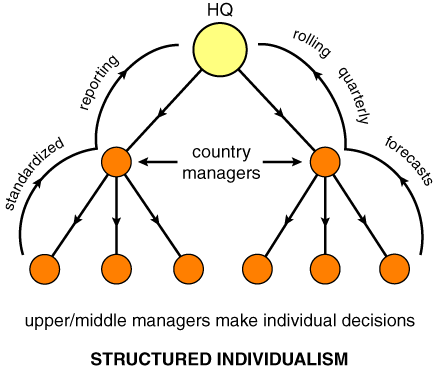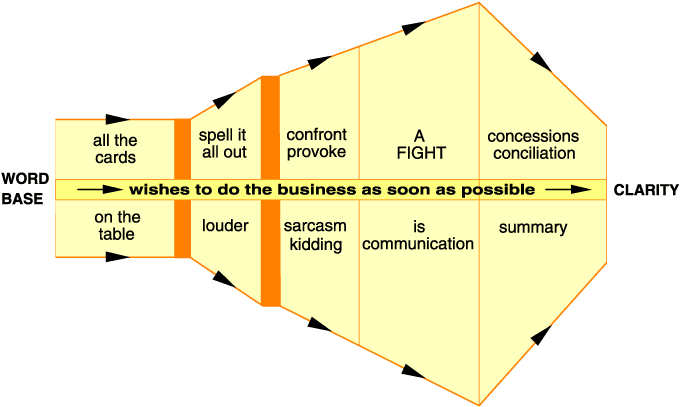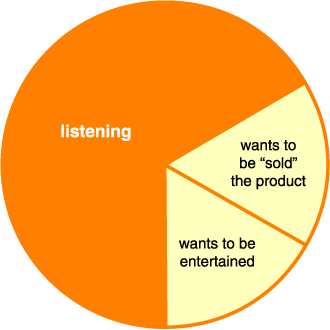Culture: interactionConcept of statusThis is based on wealth. Old money tops new money, provided there is enough of it. Top managers and magnates are more popular than professors or soldiers. Folksy presidents (Reagan, Truman, Teddy Roosevelt, Eisenhower) are preferred to intellectuals (Woodrow Wilson) or wheeler dealers (Nixon, Lyndon Johnson).
Gender issuesWomen are making their way quickly up the corporate ladder. More than 35% of managers are women, though less than 5% are top executives. They expect in most cases to be treated like men – they wear suits, pay for lunches, choose wine and often rebuff men who make a pass at them. They do not expect you to be over-solicitous with regard to their safety or comfort and are happy to take a cab home alone after a late dinner. Often they are harder than men in the negotiation process.
Leadership styleAmerican leadership symbolises the vitality and audacity of the land of free enterprise. Management structure is pyramidical, with seniors driving and inspiring people under them. Americans are allowed to make individual decisions, but usually within the framework of corporate restrictions. Managers are capable of teamwork and corporate spirit, but value individual freedom more than company welfare. They are very mobile. They get fired if they make mistakes.
Traditionally, American managers followed command-and-control style leadership, perceiving their role as making decisions, giving orders and ensuring that their employees obey. This style of management has shifted to an involvement-oriented style centring on employee commitment and empowerment. It assumes that the best way to organise is to give workers freedom and responsibility to manage their own work as much as possible. Leaders concentrate on developing workers and encouraging them to become involved and take responsibility for their own performance. Leaders and managers have become the coaches for team–building and enthusiasm among their employees. American culture means that these new approaches are often readily accepted (few Americans are afraid to take the initiative or to take on responsibility) but elements of the traditional managerial culture remain.
For the individual, success is gained and measured by achievements and responsibilities. Wealth is the ultimate symbol of success and there is great respect for those who have made their fortune through hard work and perseverance. The self-made man or woman is the symbol of the American dream.
 Language of management
Language of managementIn the USA the manager, if not always a hero, is viewed in a positive and sympathetic light, as one of the figures responsible for the nation’s speedy development and commercial services. The US is a young, vigorous, ebullient nation and its language reflects the national energy and enthusiasm. Americans exaggerate in order to simplify – low-key Britons feel they go ‘over the top’, but the dynamic cliché wears well in the United States.
The frequent tendency to hyperbolise, exaggerating chances of success, overstating aims or targets etc., allows American managers to ‘pump up’ their subordinates – to drive them on to longer hours and speedier results. American salespeople do not resist this approach, for they are used to the ‘hard sell’ themselves. Tough talk, quips, wisecracks, barbed repartee – all available in good supply in American English – help them on their way.
The ubiquitous use of ‘get’ facilitates clear, direct orders. You get up early, you get going, you get there first, you get the client and you get the order, got it? The many neologisms in American English, used liberally by managers, permit them to appear up-to-date, aphoristic, humorous and democratic.
 Motivation factors
Motivation factors Use of humour.
Put your cards on the table and see theirs.
Launch quickly into a who-does-what mode.
Don’t be afraid to talk about problems openly.
Remember nothing is impossible in the United States.
Be persistent in chasing results.
Link work and effort to return on investment.
Americans are not willing to go into great detail unless they are sure there is a deal. Settle this early.
Settle for the grand outline first, but make sure the fine print is OK subsequently.
Americans like simplification of issues and get irritated with what they see as unnecessary complications.
You will often have to explain to them possible intricacies in your culture. Otherwise they will judge everything by American standards.
Don’t play your cards too close to your chest, or they will quickly conclude you are devious.
Remember time is money.
They are not averse to taking risks; you often have to match this.
Avoid long silences; they are not used to them.
They often think aloud at business meetings; you should do the same; it shows you have nothing to hide and you may cook up some joint solutions.
They dislike protocol. Anyone can say what he/she thinks at a meeting irrespective of the status of the participants.
They often use clichés. Sometimes you need to probe the meaning.
Accept sarcasm, irony and kidding from their side.
Show toughness, but eventual willingness to make concessions.
Don’t pull rank; Americans are basically very democratic.
Show great confidence in your own product and sell it hard.
Remember they have a great work ethic and hate people taking time off or vacation when there is an important project underway.
Be innovative. Change and improvement is an obsession with them.
They are more interested in their future than your past.
General behaviour at meetingsAmericans want to conclude deals as quickly as possible. They are profit oriented and will do business with the Devil if the facts and figures are right. Persistent, tenacious businessmen who hate to give up and go home empty-handed. Often insensitive to the ‘waves’ of another culture. Assume US norms are best and that money can solve all problems. Informal in manner, showing scant respect for age or seniority.
Americans are risk-takers and hard-sellers. Negotiating, for Americans, is a process of problem-solving and compromise. Americans like fast-paced negotiations: they put their cards on the table, take off their jackets, roll up their sleeves and declare “Let’s make a deal!”. They don’t easily accept “no” for an answer, so they persevere until a solution is found.
Within American society, they tolerate great differences of opinion. But many Americans believe that American norms are the correct ones, so they lack sympathy for and understanding of foreign cultures. They believe that money ‘the bottom line’ in any argument, and don’t share or always recognise other cultures’ greater concern for status, protocol or national honour.
 Negotiating characteristics
Negotiating characteristicsAmerican businessmen have the reputation of being the toughest in the world, but they are, in many respects, the easiest to deal with. That is because their business philosophy is uncomplicated. Their aim is to make as much money as they can as quickly as they can, using hard work, speed, opportunism, power (also of money itself) as the means towards this end. Their business decisions are usually not affected by sentiment and the dollar, if not God, is considered at least Almighty. This single-minded pursuit of profit results in their often being described as ruthless. Northern Europeans are well-placed to deal with Americans successfully. Their reputation as straight-forward managers is well-received by the ‘open, frank’ Americans, who often get seriously irritated by what they see as the ‘devious’ manners of Latins and Orientals.
At meetings, the American shows the following tendencies:
They are individualistic. They like to go it alone without checking with Head Office. Anything goes unless it has been restricted.
Introduces informality immediately. Takes jacket off, uses first names, discusses personal details, e.g. family.
Gives impression of being naive by not speaking anything but English and by showing immediate trust through ultra-friendliness.
Uses humour whenever he can, even though his partner fails to understand it or regards it as out of place.
Puts his cards on the table right from the start. Then proceeds on an offer and counter-offer basis. Often has difficulty when the other side doesn’t let him know what they want.
Takes risks, but makes a definite (financial) plan which must be adhered to.
Considers most proposals on an investment/return or investment/time scale basis.
Time is always money. “Let’s get to the point.”
Tries to extract an oral agreement at the first meeting. “Have we got a deal?” Wants to shake hands on it. The other party often feels the matter is far too complex to agree on the spot.
The American wants ‘yes’ in principle and will work out details later. But he can be very tough in the details and checks on everything in spite of apparent trust. Germans, French and others prefer to settle details first.
Americans don’t like lulls or silence during negotiations. They are used to making up their minds fast. (Quick on the draw.)
They are opportunistic – quick to take chances. The history of the U.S. presented many golden opportunities to those who grabbed fastest.
Opportunism and risk-taking often result in Americans going for the biggest possible slice of the business (‘piece of the action’) 100% if possible.
Americans often lack patience. Will often say irritating or provoking things (“Look at our generous offer”) to get things moving.
Persistence. There is always a solution. Will explore all options when deadlocked.
Consistency. When they say “You gotta deal” they rarely change their mind.
They put everything in words. But when they use words like “fair”, “democratic”, “honest”, “good deal”, “value”, “assume”, they think the other party understands the same as they do. This is because U.S. sub-cultures e.g. Czechs, Germans, Poles, do understand.
Blunt. Will disagree and say so. Causes embarrassment to Japanese, Arabs, Italians and other Latins.
Often reveal brute force as argument, e.g. their financial strength or unassailable position. Will use majority vote unhesitatingly if they have it and will not spend (waste) much time striving for consensus. Are happy to fire anyone standing in the way of the deal.
Americans assume all negotiators are technically competent and expects to win on own technical knowledge. They forget the other side may see it as a matter of the status of the chief negotiator. How can a Mexican company president lose to an American engineer?
Americans regard negotiating as problem-solving through give-and-take based on respective strengths. They do not appreciate other side may have only one position.
Uncle Sam is best. But successful negotiating must enter the cultural world of the other party. Many Americans see U.S. as the most successful economic and democratic power, therefore assume that American norms are the correct ones.
This leads to lack of interest in or knowledge of the foreign culture. Americans often know little of such matters as saving face, correct dress, use of business cards, social niceties and formalities important to Arabs, Greeks, Spaniards etc.
In the U.S., the dollar is almighty and will win most arguments. Americans don’t always realise Mexicans, Arabs, Japanese and others will rarely, if ever, sacrifice status, protocol, or national honour for financial gain.
Contracts and commitmentsIn the USA a contract is final and binding. They have little sympathy with requests to ‘renegotiate’ an agreement (Asians) or failure to comply (Latin America). Americans do not hesitate to sue and exact penalties if the other side fails to fulfil obligations.
Manners and taboosSocial considerations: Americans make quick friendships and drop them just as quickly. This is partly because the average American executive changes jobs and homes 14 times in his lifetime. Friends tend to be used in certain areas, e.g. an American businessman assigned to Tokyo for 5 years will quickly find a tennis friend, a golfing friend, a bridge friend or one he regularly has lunch with. These can rapidly be replaced when he is sent to his next assignment. Deep lasting friendships are rare. Closeness developed doing ‘deals’ fast evaporates when the deal is done. Americans are great cocktail party-goers and lively companions. Their Hollywood-type smiles fail to impress some more reserved nationalities such as Germans, French and Scandinavians, who feel their jocularity is somewhat superficial. The American habit of relying greatly on clichés in conversation (“let’s get this show on the road”, etc.) can also irritate Europeans and baffle Asians.
How to empathize with themTo win trust and co-operation from Americans, simplify procedures, practices and formalities, don’t complicate them. Show them that you are confident and determined to succeed. When presenting, negotiating or just chatting, don’t forget your sense of humour. Keep your side of any oral agreements, and avoid appearing dishonest or untrustworthy by holding back too much information or through too little eye contact.
Don’t hesitate to discuss money, because it will probably the basis of your relationship. Don’t be overwhelmed by their immediate friendliness and openness, and don’t expect it to last after the deal is made. Keep in mind that long-term business relationships are rare but they will remain potential partners for future business. Americans are risk-takers so you can build a good relationship if you show you are willing to share risks with them.










